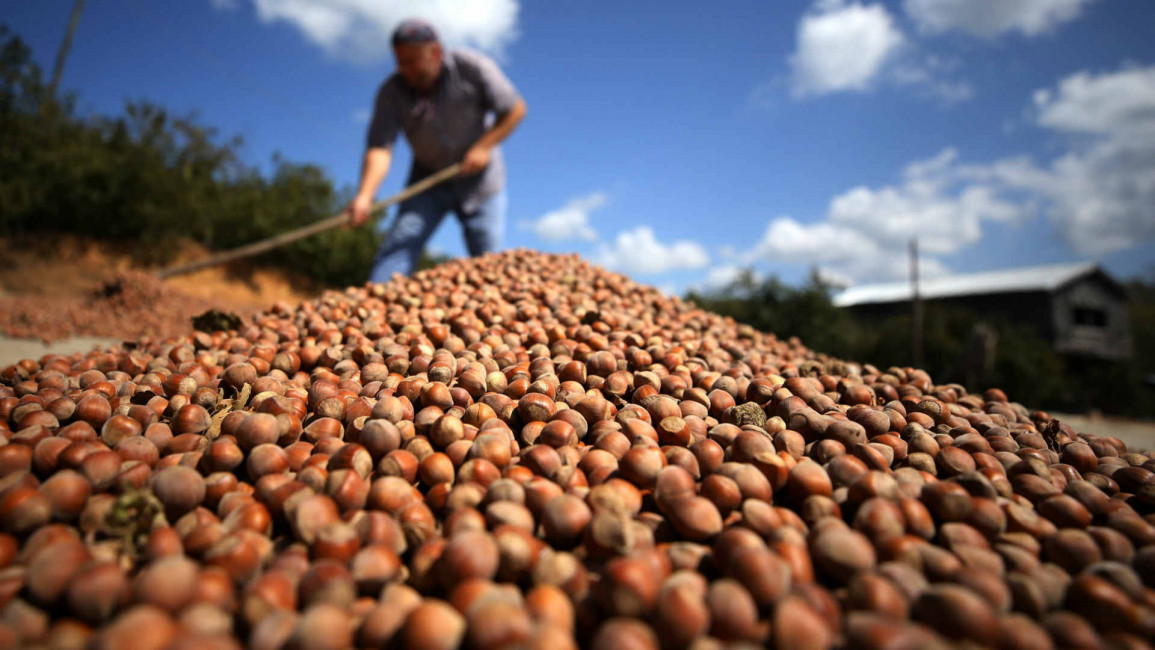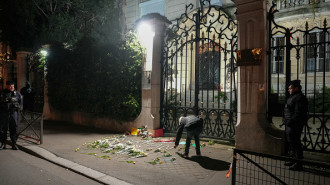Syrian refugees exploited harvesting hazelnuts for chocolate giants in Turkey
Syrian refugees, including some children, are being paid as little as $8 a day to harvest hazelnuts in Turkey, the country which produces 70 percent of the world's hazelnuts.
One of Turkey's biggest hazelnut buyers is the confectionary industry. At least a quarter of the world's hazelnuts - including a third of Turkey's harvest - go into producing Ferrero's Nutella spread, but Godiva and Nestle chocolates are also big customers.
Ferrero says it makes the necessary efforts to to prohibit child labour and ensure safety standards and workers' rights.
But with so many of Turkey's hazelnuts going to Ferrero, it's hard to know how the company can ensure Nutella remains exploitation-free.
Syrian refugees make up thousands of seasonal workers on Turkey's small hazelnut farms who are denied labour rights, The New York Times reported on Monday.
Some of them are even children.
Small agricultural businesses with less than 50 workers are excluded from having to comply with Turkey's labour code, rendering many without protections
Few Syrians have work permits, meaning they lack standard work protections. Seasonal agricultural work is one of the few areas in which Syrian nationals can work in without a permit.
Even those who do have work permits are exploited by middlemen who shave off large percentages of their wages - normally no more than Turkey's minimum wage, $471.54 a month - in exchange for connecting season agricultural labourers with farms across the country.
Legally middlemen are supposed to have a permit and a minimum level of education. In practice, they operated untrained and unregulated.
Syrians labourers say they often lie about wages to entice workers to farms, sometimes on the other side of the country.
During the harvest, workers are given just enough to afford rent and food.
Full wages are typically handed over at the end of the season in a lump sum, and workers have only informal "business cards" to prove how much they are owed.
Grueling work
Without a legal contract, many are cheated out of their meager wages.
Some middlemen even provide loans in between harvests which, in practice, work to enforce a system of indentured servitude as workers are never able to earn enough to pay off the loan.
It is impossible for confectionary companies like Ferrero to guarantee an adequate hazelnut supply without buying from Turkey's farms. With the average hazelnut farm sized at just 4 acres, they are numerous and independent, and thus near-impossible to police.
"In six years of monitoring, we have never found a single hazelnut farm in Turkey in which all decent work principle standards are met. Across the board. Not one," Richa Mittal, the director of innovation and research for the Fair Labor Association, told The New York Times.
"He told my father that this year the farmers are paying around 80 to 100 Turkish lira ($13.44 to $16.80) a day," said one Syrian, Mohammad Rudani, of a recruiter.
"But when my father got there, he realized that all the supervisors were cheating people. One of them told my father, 'We'll give you 50 lira ($8.40) a day, and that's it.'"
The work of hazelnut harvesters is grueling.
Many labourers work 12 hours a day, from seven in the morning to seven at night.
Some work as collectors, baggining hazelnuts, while others have to haul the bags, which weigh about 110 pounds each, down the mountain and into trucks.
The small sums for such long days of work necessitate seasonal labourers like Rudani working seven days a week - and many conscript their children to join them so the family has enough money to survive.
"People who don't have enough family members to work are forced to live in plastic tents by the side of the road," said Nawaaf Ibrahim, formerly a taxi driver in Syria.
Ferrero, the world's third-largest chocolate manufacturer, is secretive about its supply chain and does not name a single farm from which its hazelnuts are sourced.
The Italian company, which rarely grants media interviews told The New York Times: "Ferrero is dedicated to providing its people with safe and decent working conditions, and we request that our independent farmers do the same."
Follow us on Twitter: @The_NewArab



